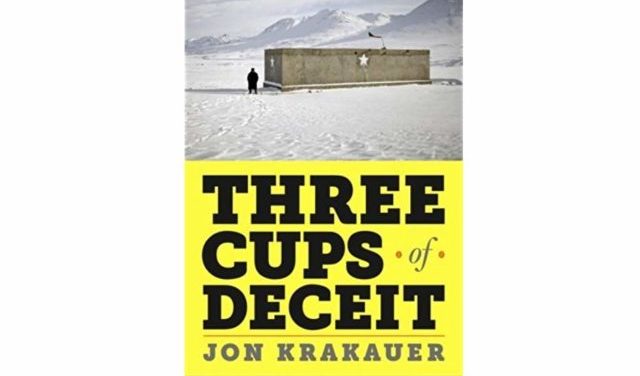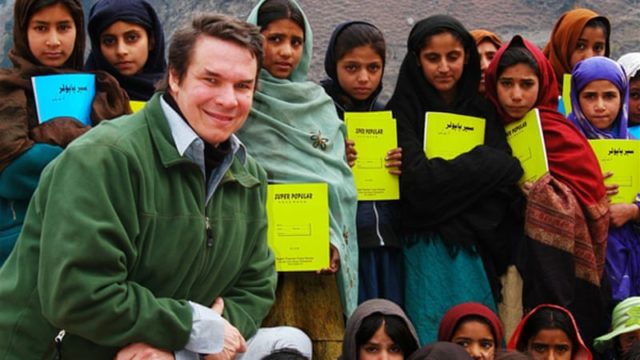On April 17, 2011, a CBS 60 Minutes report by journalist Steve Kroft raised questions about Greg Mortenson’s humanitarian efforts and his charity, Central Asia Institute (CAI). The show featured Krakauer who had been a financial supporter of Mortenson’s work, donating up to $75,000 to CAI before becoming disillusioned with the operations of the organization. A day after the airing of the episode, Krakauer released Three Cups of Deceit as an e-book to mixed reception. One reviewer described it as having a “jilted lover feel to it” while another said it was a “stunning example of investigative journalism.” In the book, Krakauer further disputes a few facts in two of Mortenson’s books; Three Cups of Tea (2007) and Stones into Schools (2009), where the humanitarian gave what Krakauer said were false and fabricated accounts of his experiences in Afghanistan and Pakistan. Some of the false experiences include being supposedly kidnapped by the Taliban, and getting lost and separated on the way down from K2.
Disputed Claims in the Three Cups of Deceit Book
Greg Mortenson had over the years built a global reputation as a selfless humanitarian and children’s crusader, attributes that have earned him a Nobel Peace Prize nomination and prompted prominent leaders like President Barack Obama to donate to his charity. However, after conducting a wide range of interviews with former employees, board members and others with inside knowledge of Mortenson and his charity, Jon Krakauer writes that all is not as it appears to be. He uncovers what he describes as multiple layers of deception behind Mortenson’s public image, adding that the image that has been created for public consumption is an artifact born of fantasy, audacity, and an insatiable hunger for esteem. Among the supposed numerous layers of deception behind Mortenson’s image, Krakauer in his quest to find the truth focuses on three questions;
- Was Mortenson’s humanitarianism truly inspired by a desire to repay the kindness shown to him by villagers who nursed him back to health when he was injured and lost on his descent down the world’s second-highest mountain, K2? 2. Was he truly abducted and held for eight days by the Taliban? 3. Does his charity fund his lifestyle and has it built all of the schools that he has claimed? In regard to the first question, Mortenson wrote in his Three Cups of Tea book that his experience in a village called Korphe in 1993 was what sent him down the humanitarian path. He writes that after losing his way and stumbling onto the village as he was making his way down from K2, he was taken care of by an elder named Haji Ali. He would later go on to spend an unspecified amount of time in the village, putting his associate degree in nursing to good use by treating a number of injured villagers, before eventually deciding to leave. Before leaving, he said he asked Haji to show him the school in Korphe which Haji revealed to him was not existent. There was however an open ledge where eighty-two children (seventy-eight boys and the four girls) were gathered copying their multiplications table in the dirt without the presence of a teacher. It was at this time that Mortenson resigned to return and build a school. Krakauer objects to this story calling it a fabrication in Three Cups of Deceit. He writes that Mortenson did not meet Haji Ali, or anyone else in Korphe, until October 1994, under entirely different circumstances than what was written in the book. Read Also: 15 Best Book Subscription Boxes and Services Online On whether or not he was truly abducted by the Taliban, Jon Krakauer writes that it is a twisted version of a trip in which he was actually hosted by generous villagers. He writes that Mortenson was shown great respect and hospitality that was in accordance with the Pashtunwali values. Krakauer further revealed that a former treasurer of CAI said Mortenson regards his charity as his personal ATM. He writes that in 2009, CAI spent 1.7 million dollars to promote Mortenson’s books, taking out full-page ads in publications like the New York Times, and chartering private planes for him to attend speaking events. The non-profit further purchased tens of thousands of copies of his books from commercial retailers in order for royalties to be paid to Mortenson, who doesn’t donate such proceeds to his charity. On the same mismanagement subject, Krakauer quotes a memo from a lawyer who examined CAI’s tax return and warned that the I.R.S. could cite Mortenson for receiving excess benefit from a charity.




